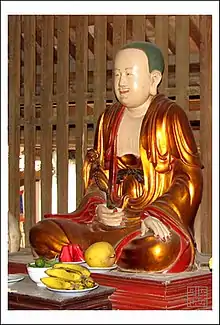
Statue of Vô Ngôn Thông in Kiến Sơ Temple, Gia Lâm, Hanoi, Vietnam
Wu Yantong (Chinese: 無言通, known in Vietnam as Vô Ngôn Thông, 759?-826 C.E.) was a Chinese Buddhist monk influential in the propagation of Buddhism in Vietnam.
Biography
Born into a wealthy family, upon coming of age he renounced that lifestyle for a monastic life and eventually realized satori or enlightenment.
Around 820 C.E., he crossed the border of southern China and arrived at Phù Đổng village to reside in the Kiến Sơ Temple in Bắc Ninh, Northern Vietnam. There he founded the Vô Ngôn Thông Zen Sect utilizing bích quán or wall-contemplation to realize the ultimate reality of the nature of mind as practiced by the founder of Zen or C'han Buddhism, Bodhidharma, an Indian monk who introduced this form of Buddhism to China around 520 C.E.[1][2]
References
- ↑ Ven. Thich Thien-An. Buddhism and Zen in Vietnam: in Relation to the Development of Buddhism in Asia. Rutland, Vermont & Tokyo: Charles E. Tuttle Company, Inc., 1975.
- ↑ Tài Thư Nguyễn The History of Buddhism in Vietnam - 2008 Page 65 "THE LIFE OF WU YAN TONG AND THE WU YAN TONG SECT In 820, about two centuries after Vinitaruci, a Chinese Buddhist monk known as Wu Yantong (Vô Ngôn Thông in Vietnamese) came to live in the Kien So pagoda located in the ..."
This article is issued from Wikipedia. The text is licensed under Creative Commons - Attribution - Sharealike. Additional terms may apply for the media files.